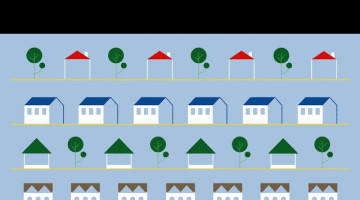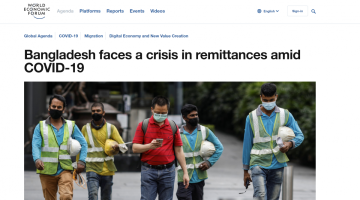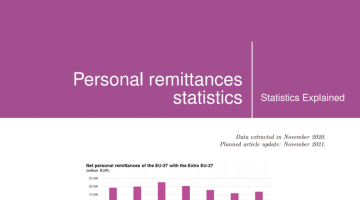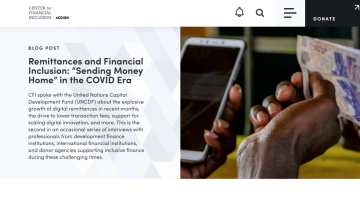Library
- Projects -
During COVID-19 digital literacy is important to bring migrants into the mainstream financial system. IOM has been involved in a range of financial literacy programs aimed at addressing migrants and their family’s financial wellbeing and improving knowledge of the financial gains arising from...
SourceInternational Organization for Migration (IOM)GCM Objectives
- Resource - Platform / Website
Led by Canada, Jamaica, and the UN Secretary-General, the initiative identified remittances as a key topic for engagement and repositioning within the UN Financing for Development Framework because of the pandemic. In particular, Discussion Group I focused on “External Finance, Remittances, Jobs and...
SourceUnited Nations (UN)
- Resource - Platform / Website
Over 40 members including international organizations, inter-governmental bodies, industry and private sector groups, networks of diaspora organizations and international experts on remittances, joined forces on 24 March 2020 under IFAD leadership, in response to the call by the UN Secretary General...
SourceInternational Fund for Agricultural Development (IFAD)
- Projects -
In 2020, amidst the COVID-19 crisis, UNCDF sought partners to respond to the increased challenges faced by migrants and their families to send and receive remittances. The goal of this initiative was to ensure that migrants and their families are supported, through continued access to affordable and...
SourceUN Capital Development Fund (UNCDF)GCM Objectives
- Projects -
With generous support from the Swiss Agency for Development and Cooperation and Sida, the Swedish International Development Cooperation Agency, UNCDF migration and remittance programme is focused on three key areas: Improve Access, Increase Usage, and Strengthen Resilience.
SourceUN Capital Development Fund (UNCDF)GCM Objectives
- Video -
Did you know that over one billion people on earth either send or receive remittances and that 50% of the half a trillion dollars sent home by migrant workers every year goes to rural places?
Join the International Fund for Agricultural Development (IFAD) to recognize the fundamental contribution...
SourceInternational Fund for Agricultural Development (IFAD)GCM Objectives
- Resource - Other
The coronavirus pandemic has caused remittances back into Senegal to dry up as COVID-19 has taken grip and lockdown measures have affected the migrant workers who normally send the money from mostly European countries such as France, Italy and Spain.
SourceUN Capital Development Fund (UNCDF)GCM Objectives
- Resource - Other
Remittances represent more than a quarter of Nepal’s economic output; The pandemic means migrant workers have swapped the risk of death or injury at work with the reality of poverty and homelessness; Financing a shift from subsistence to commercial farming could help prevent food shortages and...
SourceWorld Economic ForumGCM Objectives
- Resource - Other
The coronavirus pandemic highlights the need for better cooperation over migration; Bangladesh has offered incentives to encourage expatriate workers to send their money through legal channels; Public bodies and remittance services providers must improve access to digital solutions.
SourceWorld Economic ForumGCM Objectives
- Resource - Other
The Democratic Republic of the Congo (DRC) is home to 10 percent of the world’s entire population of internally displaced people – the largest such situation in Africa, with an estimated 5 million people. The DRC also hosts more than half a million refugees and asylum seekers from neighboring...
SourceFinDev GatewayGCM Objectives
- Resource - Other
The COVID-19 pandemic has seriously disrupted African economies, including the vital flow of remittances. To respond to these worrying developments, the Ethiopian government is pursuing policy reforms to stabilize its economy as well as formalize remittances to keep them flowing for its vulnerable...
SourceFinDev Gateway, UN Capital Development Fund (UNCDF)GCM Objectives
- Resource - Report
Debt and indebtedness are central to the lives of South-East Asian migrants. Indebtedness can motivate the need for migration; migrants regularly use loans to finance costly cross-border moves, and the remittances migrants send home are often used to repay household debt. There is a need for a...
SourceInternational Organization for Migration (IOM)GCM Objectives
- Resource - Report
This article presents statistics and comments on recent developments relating to international remittances in the European Union (EU). It refers in particular to personal remittances according to the concept of the Balance of payments and international investment position manual (BPM6). The data...
SourceEurostat
- Resource - Other
The socio-economic importance of the money sent home by Myanmar’s migrants working abroad cannot be overstated. Remittances serve to diversify and smoothen household income and are particularly critical to strengthening the financial resilience of women and rural populations. The pandemic of...
SourceUN Capital Development Fund (UNCDF)GCM Objectives
- Resource - Analysis
The Columbo Process is a a Regional Consultative Process on Overseas Employment and Contractual Labor for Countries of Origin in Asia which builds on existing institutions and collaborations at the regional level. A key thematic priority area within the Columbo process is Promoting Cheaper, Faster...
SourceInternational Organization for Migration (IOM), Columbo ProcessGCM Objectives
- Resource - Report
Building on existing institutions and collaborations at the regional level, countries with a remittance interest have set up working group to focus on remittance transfers, legislation, policies, technical assistance to governments and cooperation on specific migration corridors or on a regional...
SourceInternational Organization for Migration (IOM)GCM Objectives
- Resource - Other
Before the COVID-19 pandemic struck, many migrants were already part of marginalized and vulnerable groups experiencing economic hardships in their countries of origin and host communities. Lockdowns and business closures have exacerbated the precarious nature of their livelihoods.
SourceCenter for Financial Inclusion (CFI)
- Resource - Report
This methodology has been developed to collect data reported through a countries Balance of payments, relating to monetary transfers including remittances for the purposes of investment, trade and enterprise development. Collection of such disaggregated data will enable a better policy understanding...
SourceInternational Organization for Migration (IOM)
- Resource - Guidelines/Toolkits/Manuals
Although remittances are private transfers, they form an important part of external financial flows for countries and flow directly to the achievement of several SDGs including those relating to health, education, nutrition and housing. The note provides an overview of the work of the UN System in...
SourceUN Joint SDG FundGCM Objectives
- Resource - Guidelines/Toolkits/Manuals
This is the first-ever manual providing detailed guidance on the compilation of remittances. Data on remittances are important for policymaking, analysis, and research purposes. Using the detailed guidance provided by this manual, economies will be able to substantially improve the quality of these...
SourceInternational Monetary Fund (IMF)
Pagination
About the Migration Network Hub
What is the Migration Network Hub?
The Hub is a virtual “meeting space” where governments, stakeholders and experts can access and share migration-related information and services. It provides curated content, analysis and information on a variety of topics.
The Hub aims to support UN Member States in the implementation, follow-up and review of the Global Compact for Migration by serving as a repository of existing evidence, practices and initiatives, and facilitating access to knowledge sharing via online discussions, an expert database and demand-driven, tailor-made solutions (launching in 2021).
Submit your content
What content is displayed in the Hub?
The Hub aims to help you find information on migration, ranging from policy briefs and journal articles, existing portals and platforms and what they offer, to infographics and videos. The different types of resources submitted by users undergo peer review by a panel of experts from within the UN and beyond, before being approved for inclusion in the Hub. To provide guidance to users based on findings of the needs assessment, the content is ordered so that more comprehensive and global resources are shown before more specific and regional ones. Know a great resource? Please submit using the links above and your suggestion will be reviewed. Please see the draft criteria for existing practices here.
Apply to join the Peer Review Roster
Content submitted to the Migration Network Hub is first peer reviewed by experts in the field from both the UN and beyond. Applications are welcomed to join the roster on an ongoing basis. Learn more here.
Contact us
We welcome your feedback and suggestions, please contact us
*References to Kosovo shall be understood to be in the context of United Nations Security Council resolution 1244 (1999).
Newsletter
Subscribe to our newsletter.